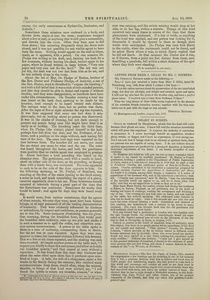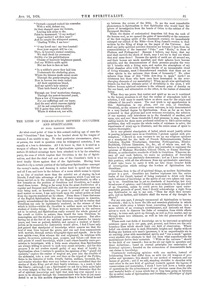< Correspondence (continued from page 7-227) >
...
Belief in Spirits
Ossian, as rendered by Macpherson, pleads that the dead still exist, because their ghosts are seen. I know full well the senseless incredulity which will greet this argument. It requires the audacity of conviction to pronounce it. I never knowingly beheld an apparition, whether ghost, wraith, or doppel, and I have no expectation of ever seeing one. But I am sure that if beings exist in an ethereal or spiritual form, there are persons who are capable of seeing them. I do not believe that all spectral appearances are produced by a deranged digestion or disturbed molecular adjustment of the brain. I am totally incapable of such credulity.
To illustrate this belief we will now cite two or three examples which it seems to me cannot be candidly questioned. M. Matter, a French gentleman, holding a position in the Department of Public Instruction at Paris, stated to a well-known American in 1859 that he paid a visit to Friedrich Oberlin, the celebrated pastor of Ban-de-la-Roche, in Alsace. Oberlin submitted to his inspection a manuscript prepared by himself, entitled, Journal des Apparitions et Instructions par Reves. He found it to contain, among other things, a narrative of a series of apparitions of his deceased wife, and of his interviews (entretiens) with her. “Oberlin was convinced,” said M. Matter, “that the inhabitants of the invisible world can appear to us, and we to them, when God wills; and that we are apparitions to them as they are to us.”
Miss Anna Maria Porter, the author, relates that during her residence at Esher, in Surrey, England, an old gentleman was in the habit of visiting her house of evenings, reading the newspapers and drinking a cup of tea. One evening she saw him enter as usual, and seat himself at the table, but without speaking. She addressed some remarks to him, but he made no reply. After a few seconds she saw him rise and leave the room without uttering a word. Astonished and alarmed at this conduct, she immediately sent a servant to his house to make inquiries. The reply was brought back that the old gentleman had died suddenly about an hour before.
It is also related that a gentleman in London who was familiar with the late George Smith, the celebrated Assyriologist, heard his name called in Mr. Smith’s natural tone of voice on the afternoon of the day that he died at Hierapolis, in Syria, in August, 1878.
Indeed, so general is the belief of mankind, from all antiquity, upon this subject, that there is no people among whom apparitions of the dead are not related and believed. “This opinion,” remarks Dr. Samuel Johnson, “which prevails as far as human nature is diffused, could become universal only by its truth; those who never heard one another would not have agreed in a tale which nothing but experience could make credible.” Addison also declares: “Could not I give myself up to this general testimony of mankind, I should to the relations of particular persons who are now living, and whom I cannot distrust in other matters of life.”— A. Wilder, in Evolution.
Freethinkers Arrested
...
The Lines of Demarcation Between Occultism and Spiritualism
At what exact point of time in this onward rushing age of ours the word “Occultism” first began to be bruited about by the tongue of rumour, I am unable to say. To what particular circumstance, place, or person, the word in question owes its widespread notoriety, I am equally at a loss to determine. All I do know is, that it is used as a weapon of offence by one class of Spiritualists against another, and certain ill-defined meanings have been attached to it by the attacking party, the sum of which implies that Occultism is the foe of Spiritualism, and that the chief end and aim of the Occultist’s faith is to level deadly blows against that of the Spiritualist. Having been classified—by a certain portion of the belligerent Spiritualists—amongst the enemy’s ranks, and deeming it rather hard to spend my lifetime and all I am and have in the defence of a cause which seems to rejoice in no line of conduct more than the suicidal act of slaying its best friends, I shall take advantage of the discussions which I am told are being carried on in the columns of the English Spiritualist, to offer a few remarks on the position of Occultism and Occultists, as I understand these terms. Being so far away from the great desideratum of a regular and frequent mail delivery, and the immense pressure upon my time being now, as heretofore, too great to permit of my studying mail matter en masse, I can only touch upon the salient points at issue from the reports rendered me by others. From these I learn that some of the English Spiritualists, like many of their compeers in America, greatly misunderstand the terms they denounce, and fail to realise that Occultism can only be legitimately rendered, as the science of that which is hidden—whilst the Occultist is neither more nor less than a student of hidden things. If there were no mysteries in the universe yet to be solved, and Spiritualism really covered the whole ground of the occult or hidden in nature, then would the term Occultism be meaningless, and the studies it points to be supererogatory. But after having sat at the feet of my spiritual pastors and masters for twenty years, and been as patient, faithful, and earnest a student of Spiritualism as its resources for instruction would allow, I find I have only just gained that standpoint of knowledge which assures me that the soul of man lives beyond the grave, and can and does communicate with mortals, through certain telegraphic signs and signals. As to the how spirits come, from whence the soul originated, its relations with matter, its powers, potencies, past, present, and future—all these are still points of occult knowledge, which I and others humbly crave permission to investigate, with a little more attention than Spiritualists are always willing to accord to such very occult subjects; and for this purpose I do not confess myself guilty of any want of loyalty to Spiritualism when I venture to question the opinions of the “grand old ancients,” explore the realms of magical art, peer into the crucible of the alchemist, take a seat now and then on the tripod of the Pythia, listen to the histories of trolls, dwarfs, fairies, undines, brownies, &c., and wonder whether they were any better or worse accredited than the stories of Katie King and all their family relations; in a word, I take the liberty—although I am a Spiritualist—to ask for a little more light on every subject to-day than I had yesterday, and determine that the all of spiritual knowledge and light that man has ever enjoyed is no more to be obtained through the communicants who have as yet manifested to us in this modern dispensation than it is to be found bound <... continues on page 7-229 >
Editor's notes
- ↑ Belief in Spirits by unknown author, London Spiritualist, No. 312, August 16, 1878, p. 78
- ↑ Freethinkers Arrested by unknown author, Sun, The, Wednesday, August 28, 1878
- ↑ The Lines of Demarcation Between Occultism and Spiritualism by Britten, E.H., London Spiritualist, No. 312, August 16, 1878, p. 81
Sources
-
London Spiritualist, No. 312, August 16, 1878, p. 78
-
London Spiritualist, No. 312, August 16, 1878, p. 81


